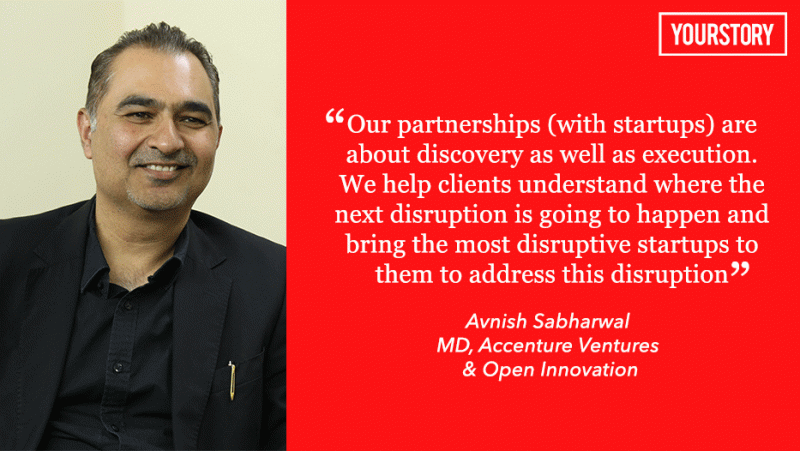Avnish Sabharwal on creating win-win outcomes for Accenture, its clients and startups through Accenture Ventures

The year 2018 has seen over $10 billion in investments in the Indian startup ecosystem. And every year, investor interest in Indian entrepreneurial ecosystem continues unabated — proof of which is in the growing number of venture funds, corporate accelerators and incubators, and an even greater increase in the number of startups.
But amidst all this action, Avnish Sabharwal, Managing Director of Accenture’s venture capital arm Accenture Ventures in India, says it’s not just about the numbers, it’s about value creation.
Avnish says Accenture Ventures differentiates itself from the rest with its singular focus on creating a win-win situation for all stakeholders. To be clear, Accenture Ventures works with startups involved in disruptive innovation, with an eye on ensuring the success of these ventures and creating value for Accenture and its Global 2,000 clients.
Avnish and his team collaborates with growth-stage business-to-business (B2B) startups that are involved in innovations in deep technological and digital domains like AI, IX.0, AR/VR, cyber security, blockchain, DevOps, RPA, and UX/UI, among others.
“We want to make sure that all the three parties which are involved – our client, Accenture, and startups – are all in a win-win situation where none of them think that they have been taken for a ride,” Avnish says.
Globally, Accenture Ventures partners with around 100 startups in these two domains through the company’s Open Innovation Programme. Around half of those partnerships are in India which is the most successful geography for Accenture Ventures globally.
“The partnerships are about discovery as well as execution. We help clients understand where the next disruption is going to happen and bring the most disruptive startups to them to address this disruption,” Avnish says.
In other words, Accenture creates visibility for these startups among the company’s global clients and provides these startups the opportunity to solve a business problem for their clients working along with Accenture industry, consulting and delivery teams.
“This is not an innovation theatre for us where we come and parade a few startups in front of our clients and executives and then they disappear. For us, value creation has been very important from day one,” he adds.
Putting startups first
To create value, Accenture Ventures acts as a bridge between the startups and Accenture’s global clients, with a focus on real business outcomes. To achieve this, Accenture differentiates itself by treating the startups they work with as equal partners, viewing these ventures as an extension of Accenture itself and not as a vendor or a supplier.

For example, Accenture Ventures has made significant changes to its internal processes to position startups for success in a large complex organisation like Accenture and its G2000 clients. These have included revising the company’s procurement, legal, and contracting processes to retain the agility and innovativeness of the relatively small start-ups.
“Had we just treated them as a supplier, we would not have made those changes. I think we have always kept the interest of the startup first. We know what their limitations are and we try to make sure that we are able to address those limitations,” says Avnish.
And this strategy – of putting the interests of the startups first – has proven beneficial on more counts than one, he adds. The biggest benefit, however, is the significant improvement in the agility of Accenture’s own employees.
“When you see startups thinking very innovatively and looking at a problem very differently that improves the innovation quotient of our employees as well. So, I think it has been a great partnership. We have probably received much more then we have given to the ecosystem and we are very excited for the future prospects as well,” Avnish says, adding that he is “very, very happy” with his “Rockstar team’s accomplishments” in 2018.
Partnering and investing in innovation
As part of Accenture’s Open Innovation program, which Avnish heads in India, Accenture Ventures combines the consulting services and domain expertise of Accenture with the IP, product or platform of the start-ups to create a really unique value proposition for the client.
Accenture Ventures also makes strategic minority investments in startups, doing so in Series B and C funding rounds led by a venture capitalist. Its investments are in the range of $1 million to $10 million. Till date, Accenture Ventures has made around 26 investments globally through its global fund, although it does not disclose country-specific investments.
In India for the past four years, Avnish and his team have made great strides in building strategic alliances with various stakeholders in the Indian startup ecosystem, including VCs, angel investors, accelerators, incubators, academia, entrepreneurs, and industry bodies. They act as our ‘sourcing channel’, adds Avnish
Accenture Ventures has closely collaborated with around 50 startups in the Indian startup ecosystem since its launch in the market. These startups are selected after a rigorous selection process that requires them to tick all the right boxes in the 40-odd criteria Accenture Ventures has outlined in the technology and business categories.
Highlights of 2018 and looking ahead
Accenture Ventures began the year 2018 by announcing a partnership with Microsoft Accelerator, the tech giant’s programme to empower startups. The partnership, aimed at strengthening the Indian startup ecosystem, will support growth-stage B2B tech start-ups specialising in the Internet of Things (IoT), artificial intelligence (AI), augmented/virtual reality, big data, fintech, security, blockchain, and customer experience solutions.
The ecosystem partnership aims to help startups deploy solutions in large Indian and global client environments, innovate on their business model and sharpen their go-to-market strategy, the two companies said in a statement. Startups stand to benefit from Accenture Ventures and Microsoft Accelerator’s shared innovation ecosystems that comprises start-ups, venture capitalists, universities, and corporate R&D labs or innovation hubs.
“Not only have we developed the ecosystem very well, we work with some of the best VCs, accelerators, incubators, and companies like YourStory,” Avnish says.
Accenture Ventures in May partnered with YourStory to launch the Industry X.O Challenge, as part of its annual programme to recognise and reward B2B startups solving some of the most challenging business problems in the digital space.
“That (Industry X.O Challenge) has been a very very big success for us. In fact, that was one of the highlights of 2018 and the top two-three startups which won our competition are going places. So, I think we're going to be doing much more of that,” Avnish says.
IIT-Madras incubated Detect Technologies won first place in the Industry X.O. Challenge for its intelligent asset-monitoring solution, while Ecolibrium Energy came in second for its IoT-based predictive asset intelligence platform SmartSense, followed by SatsSure for its use of satellites, AI, and big data to enable insight-driven decision-making across various sectors.
Still, Avnish believes Accenture Ventures success in the Indian startup ecosystem thus far is nothing but a drop in the ocean. Going forward, Avnish and his team will be focusing on scaling their efforts further in the Indian startup ecosystem through contests like the Industry X.O Challenge as well as the creation of other new innovative engagement models with start-ups.
The challenges today and Accenture Ventures impact
And yet, for startups to scale across geographies, there are a few challenges to be overcome, chief among them delivery and go-to-market strategy, says Avnish.
“The delivery part of it is still not in the DNA of many startups. They are great innovators but doing large-scale delivery across geographies and across businesses needs a different kind of skill. So, I think that is one skill which startups should be good at. If they can do that, I think that will help them scale and globalise much faster from India,” he adds.
Corporate accelerators and investors also need to go beyond the “startup tourism” and “startup zoo” stage and do more to enable the Indian startup ecosystem, says Avnish. He describes startup tourism as big organisations engaging in jumping from one startup to another and startup zoo as parading of startups before clients and executives, with only a few of these startups moving to the proof of concept (PoC) stage and fewer still beyond a PoC into deployment where actual value creation happens.
As such, corporate accelerators need to focus on value creation rather than just branding, he says.
In addition, Indian corporates have been conspicuous in their limited presence when it comes to major investments and acquisitions being made in Indian startups, Avnish says.
“If it is an early-stage deep-tech startup, they have been picked up by companies like Google or Facebook. Or if it is a big startup like Flipkart, it’s been picked up by Walmart. You really haven't seen great investments or acquisitions happening from Indian corporates and I think they need to do their bit for the Indian ecosystem,” Avnish adds.

Accenture Ventures, on the other hand, has made deep inroads in the Indian startup space, by championing companies that engage in disruptive innovation and proving their competitiveness even among some of the best startups in the world.
“We have helped globalise a lot of our Indian startups. We have taken them to our international clients and they are doing remarkably well, competing with the best of startups in various parts of the world and we are very excited about the prospects,” Avnish says.
And that excitement is palpable, as he adds with a bright smile,
“I believe I have the most exciting job in Accenture.”
“I've been really lucky that I'm able to do what I am able to do within the brand of Accenture. Working day in and day out with some of these disruptive, leading-edge startups actually keeps me young and turbo-charged. So that's the real prize: to do this kind of work within a big corporate and make a real impact for the eco-system, our clients and of course, Accenture,” says Avnish.







